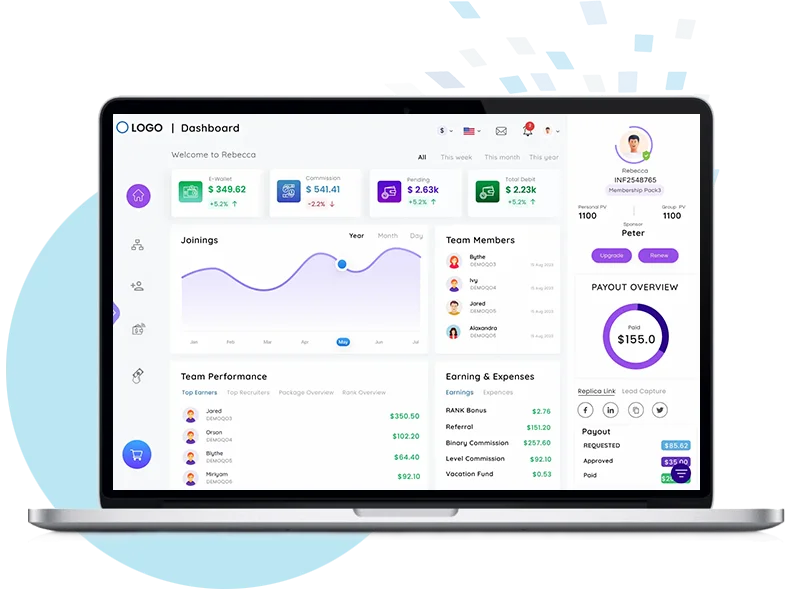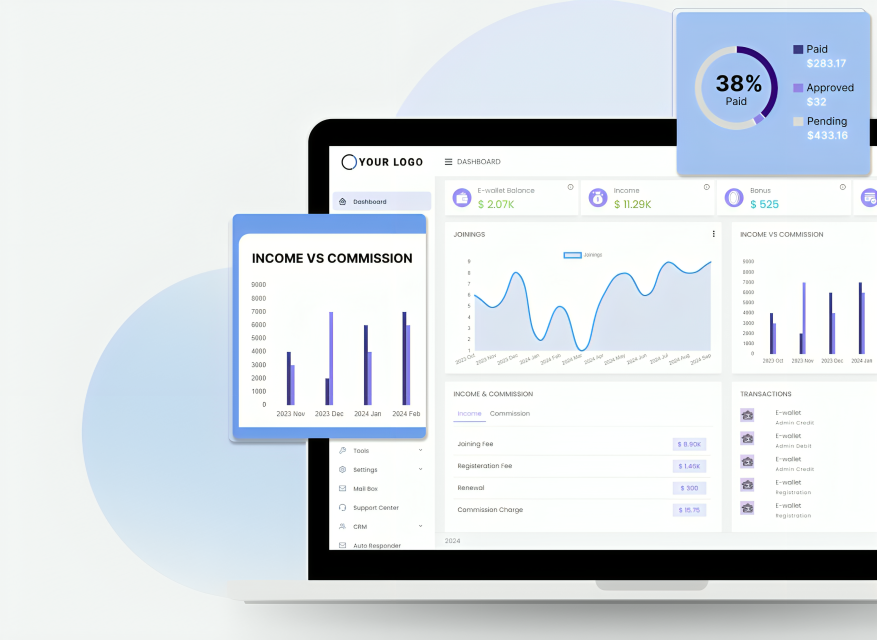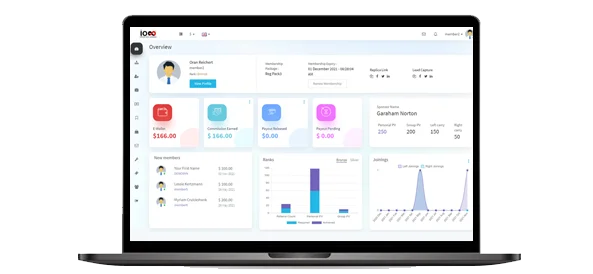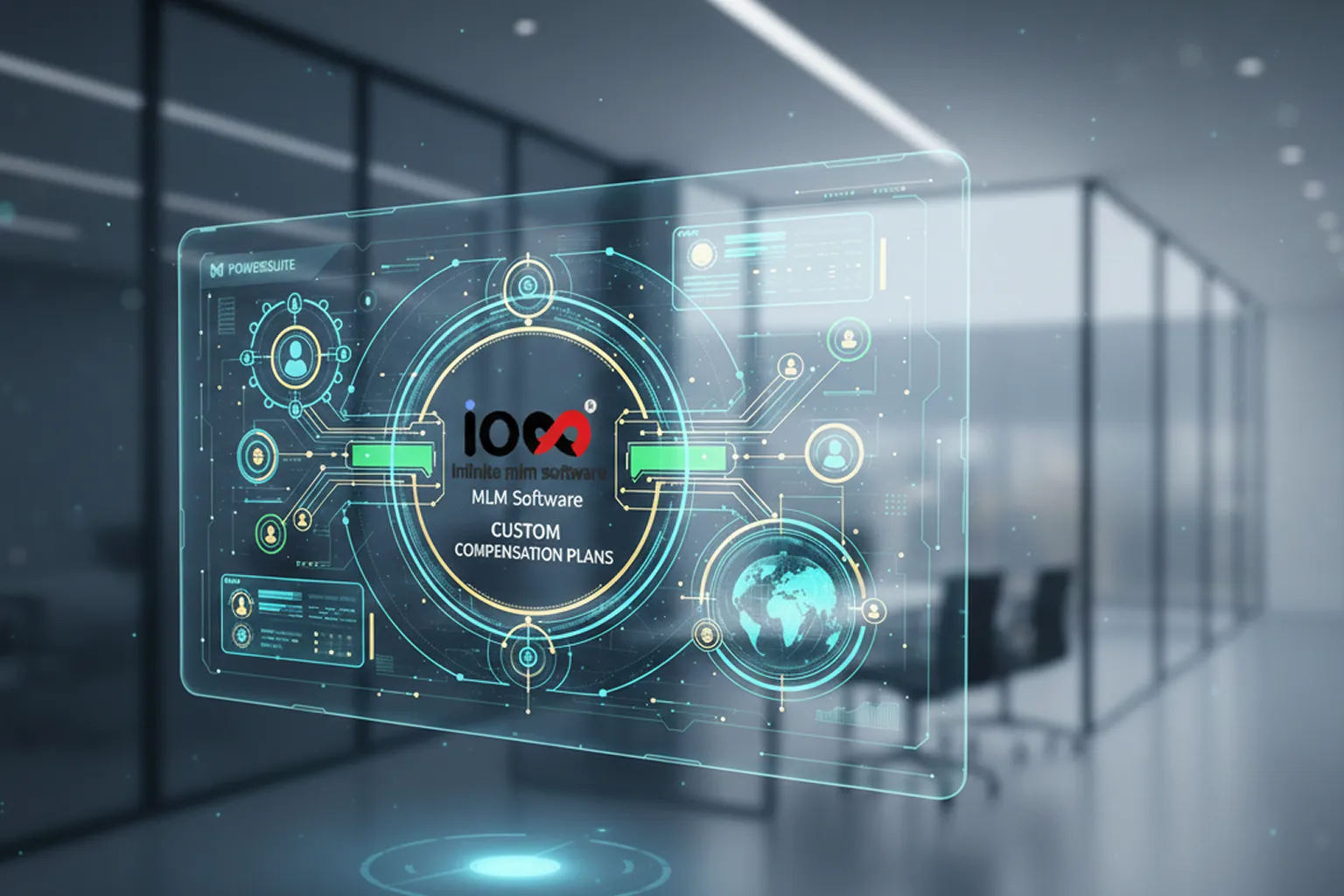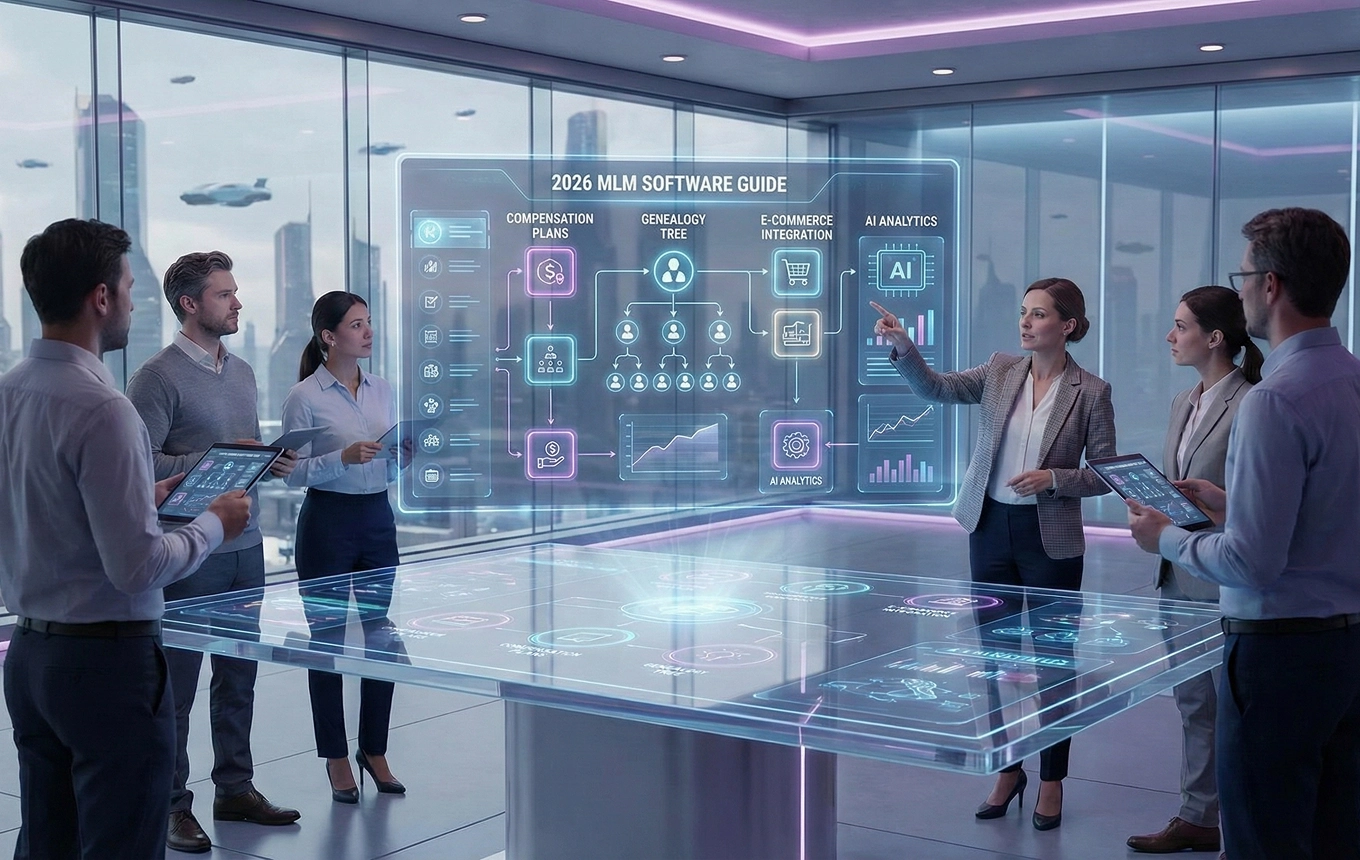As direct selling companies grow, operations become more complex, managing distributors, multi-tier commissions, inventory, compliance, and customer relationships can quickly overwhelm outdated systems.
The solution? MLM ERP software; a purpose-built platform that unifies all core business functions, delivering real-time visibility and automation to help you scale efficiently.
Key benefits:
-
ERP adopters see a 20–30% boost in efficiency
-
Commission errors drop by up to 40%
-
Admin workload is cut by up to 50%
With 70% of direct selling companies struggling with fragmented data, the right MLM software integrated ERP becomes essential, not optional, for sustainable growth, compliance, and profitability.
Is your system built to scale with you?
What are manual processes really costing your business?
Find all the answers that will bring great changes to your MLM Business.
What is ERP For?
ERP (Enterprise Resource Planning) is a software system that helps businesses manage and automate core processes like finance, inventory, sales, HR, and supply chain in a single integrated platform to improve efficiency and decision-making.
What is MLM ERP Software?
MLM ERP Software is an integrated enterprise resource planning solution customized specifically for Multi-Level Marketing businesses. According to eurostats, in 2023, 43.3% of enterprises in the European Union utilized Enterprise Resource Planning (ERP) software applications, with adoption rates soaring to 86.3% among large enterprises. It combines the essential features of traditional ERP systems such as finance, inventory, HR, and CRM tools with specialized MLM components like distributor management, genealogy tracking, commissions and bonuses, and plan configuration.
Unlike generic ERP systems, MLM ERP platforms are purpose-built to address the layered network structures, payout calculations, and dynamic workflows that define direct selling models. This all-in-one solution ensures every aspect of the business from backend operations to distributor engagement is seamlessly connected and automated.
Why Every MLM Business Needs an ERP Software?
Multi-Level Marketing companies operate across a web of complex hierarchies, commission structures, and inventory flows. As businesses grow, manual systems or disconnected software tools quickly lead to inefficiencies, data silos, and compliance issues. Here’s why ERP software is essential for MLM companies:

Centralized Data Management
ERP consolidates all key data; sales, distributors, orders, automated payouts, support tickets, into one platform, enabling better decision-making and transparency.

Automation of Core Processes
Repetitive tasks like automated commission calculator, bonus payouts, and inventory tracking are automated, reducing human error and administrative overhead.

Improved Distributor Experience
Distributors can access real-time dashboards, performance reports, order histories, and payouts, boosting engagement and customer retention.

Compliance & Regulation
Built-in compliance features ensure the company stays aligned with tax rules, data privacy laws, and direct selling regulations.

Scalability
As the network grows, an ERP system provides the infrastructure to scale without operational breakdowns.
In short, an MLM ERP system isn’t just a convenience, it’s a necessity for companies aiming for long-term success and simplified operations.
How an Integrated ERP System Enhances MLM Operations?
An integrated MLM system with ERP acts as the backbone for modern direct selling organizations, combining the flexibility of network marketing strategies with the robustness of enterprise-grade infrastructure. And plus, according to netsuite studies, the global ERP software market has grown dramatically in recent years, expanding to $48 billion in 2022 and is expected to rise to $96 billion by 2032. Thus, having an ERP MLM Software will be a great game changer to our business.
In traditional setups, businesses often rely on separate software solutions for handling sales tracking, inventory, customer relationship management, payouts, and human resources. This fragmented approach leads to inefficiencies, data inconsistencies, and high operational costs.
By contrast, an integrated solution unifies all these moving parts into a cohesive ecosystem that supports the complete MLM lifecycle, from distributor onboarding and product ordering to compensation processing and performance analytics. This alignment not only enhances internal coordination but also improves distributor satisfaction by ensuring consistent, accurate, and transparent experiences across every interaction point.
Key Advantages of a Unified MLM and ERP System

Advanced Data Flow Across Departments
Integrated systems eliminate duplication and manual data entry. Sales data from distributors automatically updates inventory management, triggers commissions, and syncs with accounting, all in real time.

Enhanced Financial Accuracy & Payout Transparency
With integrated accounting and compensation engines, payouts are calculated accurately based on real-time sales, downline performance, and custom compensation plans. This builds trust with distributors and ensures timely commissions.

360-Degree Business Visibility
Executives and managers can view real-time dashboards and analytics for every aspect of the business revenue, distributor growth, rank progression, product performance, and more from a single source of truth.

Operational Efficiency & Reduced Costs
Automation across departments reduces the need for manual oversight, lowers the risk of errors, and optimizes resource usage, ultimately cutting operational costs.

Faster Onboarding & Support for Distributors
From KYC verification to plan activation and training, the integrated system ensures smooth onboarding and continuous support for new recruits.

Adaptability to Custom MLM Plans
Whether you’re running a Binary, unilevel, matrix, or hybrid plan, an integrated MLM ERP can be configured to accommodate diverse payout structures and business rules.

Real-Time Inventory & Logistics Sync
Syncing inventory across warehouses, order management systems, and the distributor network prevents stockouts, delays, or mismanaged logistics.
83% of direct selling businesses using integrated ERP MLM software report faster commission processing and improved distributor retention within the first year.
Top Core Features to Look for in MLM ERP Software
An effective MLM ERP software goes beyond basic MLM commission software or downline visualization. It functions as a fully integrated, enterprise-grade system that simplifies every core aspect of direct selling operations from managing distributors and inventory to ensuring timely and compliant payouts.

1. Commission & Payout Management
At the heart of any MLM business lies its compensation plans. MLM ERP software automates the intricate process of calculating and distributing commissions, bonuses, and incentives across multiple levels of the distributor network.
Key Capabilities:
-
Configurable support for multiple compensation models; Binary, Unilevel, Matrix, Hybrid, etc.
-
Real-time commission calculation based on sales volume, downline activity, rank, and bonuses
-
Tax compliance (e.g., GST, VAT, TDS) and multi-currency payout support
-
Scheduled and on-demand payouts via integration with diverse range of payment gateways
-
Transparent payout reports accessible to each distributor
This ensures payout accuracy, distributor satisfaction, and compliance with financial regulations.
2. Downline Tracking and Genealogy Visualization
MLM organizations rely on multi-tiered distributor hierarchies, making it essential to track network growth and member relationships accurately.
Key Capabilities:
-
Interactive genealogy tree to visualize downline structure and growth
-
Role-based access to view personal or team networks
-
Downline performance metrics such as sales volume, activity, and rank progression
-
Historical views to track changes in network structure over time
-
Data drill-down for leadership to analyze weak links, inactive legs, or downline growth
This feature provides complete visibility into the health and depth of the network, supporting smarter decision-making and targeted coaching.
3. Real-Time Dashboards and Reporting
In a dynamic MLM environment, real-time insights are essential for both executives and field agents. MLM ERP platforms come equipped with customizable dashboards aligned for different roles.
Key Capabilities:
-
Role-based dashboards for administrators, managers, and distributors
-
Live updates on KPIs such as sales performance, commissions, recruitment stats, and product movement
-
Drill-down charts and analytics on distributor performance, region-wise sales, churn rates, and growth projections
-
Exportable reports for finance, compliance, and business intelligence
-
Alerts and notifications for rank upgrades, target achievement, or inactivity
This empowers leadership and distributors to make informed, data-driven decisions in real time.
4. Product Inventory and Logistics Management
Managing physical products across warehouses and distributor networks is a major challenge in MLM. ERP integration ensures inventory and logistics are tightly aligned with sales and procurement workflows.
Key Capabilities:
-
Real-time inventory tracking across multiple warehouses or fulfillment centers
-
Auto-replenishment based on sales patterns and safety stock thresholds
-
Order management, invoicing, and shipment tracking
-
Integration with eCommerce inventory system, 3PL, or in-house dispatch systems
-
Product bundling and promo code management for kits or offers
This results in faster fulfillment, fewer stockouts, and improved distributor satisfaction.
5. User Management for Sellers and Distributors
Distributors are not just sales agents, they are business partners. Effective user management ensures they have the tools, information, and access they need to succeed.
Key Capabilities:
-
Role-based access control (Admin, Distributor, Sub-distributor, Finance, Support)
-
Distributor profile management, KYC documentation, onboarding workflows
-
Self-service portals with commission reports, e-wallets, team stats, and reward tracking
-
Login activity tracking and device management for security
-
Messaging tools and announcement panels for company-wide updates
This promotes a personalized and secure user experience, enhancing distributor engagement and operational control.
6. Business Rule Customization
Every MLM company has unique rules, whether related to payouts, promotions, ranks, compliance, or inventory. MLM ERP software allows for deep customization to align with specific business strategies and regulatory needs.
Key Capabilities:
-
Custom rule engine to define workflows, eligibility criteria, and sales targets
-
Dynamic configuration of MLM compensation plans and incentive programs
-
Rule-based access to features, reports, or promotions based on rank or region
-
Regulatory compliance configurations per country or state
-
Product-wise sales restriction or pricing strategies per distributor level
This gives businesses the flexibility to adapt the platform to their growth model without coding or external dependencies.
Choosing MLM ERP software with these core features enables direct selling organizations to scale operations, improve distributor satisfaction, and remain agile in a rapidly evolving marketplace. Whether you’re running a consumer product MLM in makeup, skincare, health & wellness, or service-based network, these capabilities are fundamental to operational excellence and long-term success.
Conclusion
The future of direct selling belongs to businesses that run smart, connected, and automated. As your distributor base expands and operations get more complex, traditional tools will only slow you down. MLM ERP software offers a powerful, all-in-one solution that simplifies operations, ensures compliance, enhances distributor engagement, and supports rapid, scalable growth.
With features like real-time commission tracking, automated workflows, inventory sync, and robust analytics, this technology isn’t just a convenience, it’s a strategic necessity. Whether you’re struggling with manual processes, inconsistent payouts, or data silos, now is the time to invest in a purpose-built platform that brings clarity, efficiency, and agility to your entire MLM ecosystem.
Frequently Asked Questions
ERP MLM (Enterprise Resource Planning for Multi-Level Marketing) software is a system that integrates core business functions like sales, inventory, finance, and HR with MLM-specific features like genealogy tracking, commission calculations, and distributor management. It automates processes across the MLM network, improving efficiency and transparency.
Top features include real-time commission tracking, e-wallet integration, multi-currency support, binary/unilevel/forced matrix plan compatibility, inventory and warehouse management, secure user dashboards, and mobile app access.
The software automates commission calculations based on the MLM plan (binary, matrix, etc.), tracks performance across levels, and ensures timely and accurate payouts through integrated e-wallets and payment gateways.
Yes, modern ERP MLM software is highly scalable. It can support small startups to large MLM enterprises with thousands of distributors, multiple hierarchies, and global operations without compromising speed or accuracy.
Most advanced ERP MLM software solutions offer full customization options, allowing you to adapt the system to binary, matrix, hybrid, or custom MLM compensation plans, including custom rules, bonus structures, and branding.
The cost varies depending on features, customization, user count, and support requirements. Prices generally range from $2,000 to $25,000+ for enterprise-grade solutions, with options for monthly SaaS subscriptions or one-time licenses.

